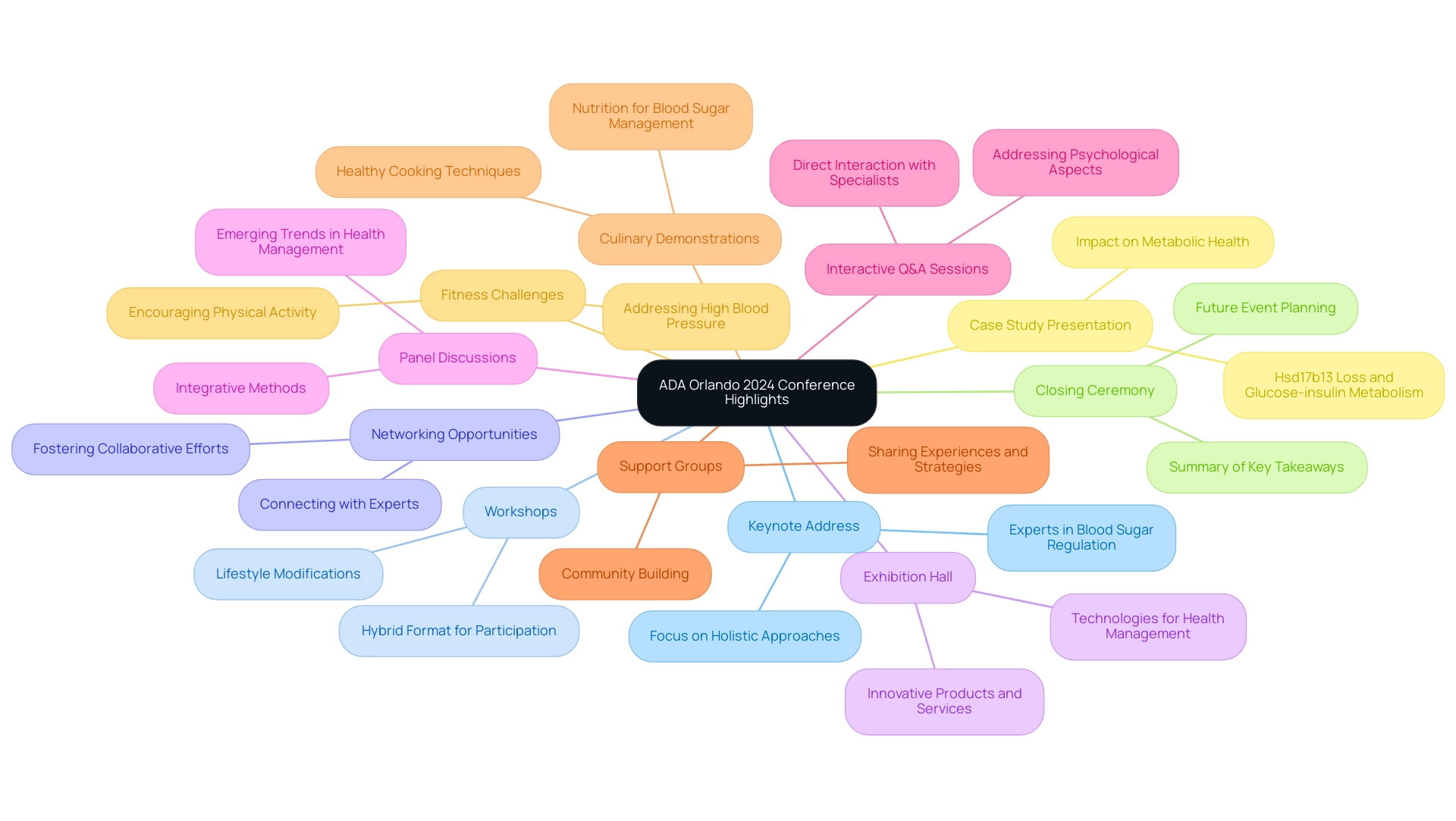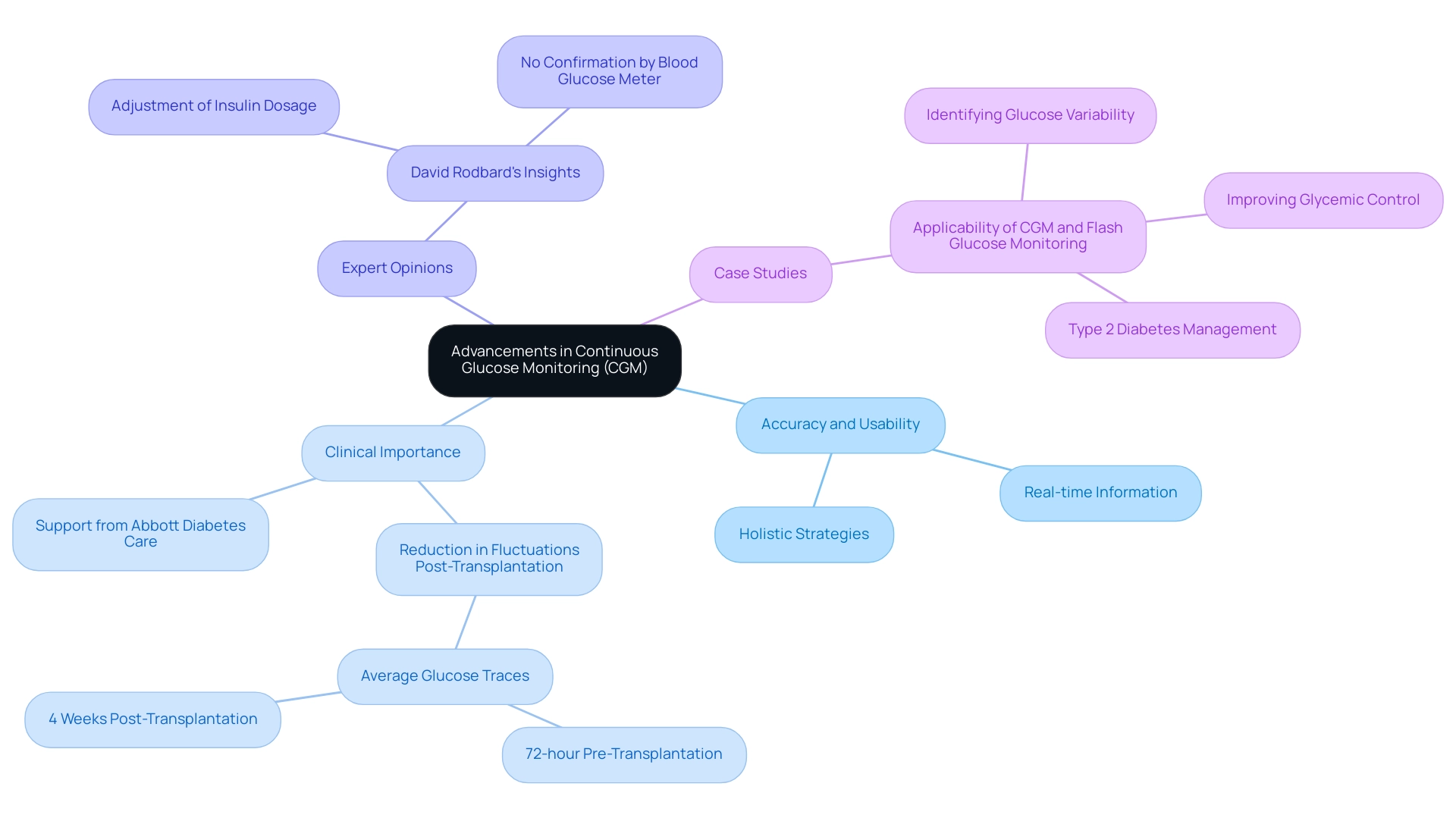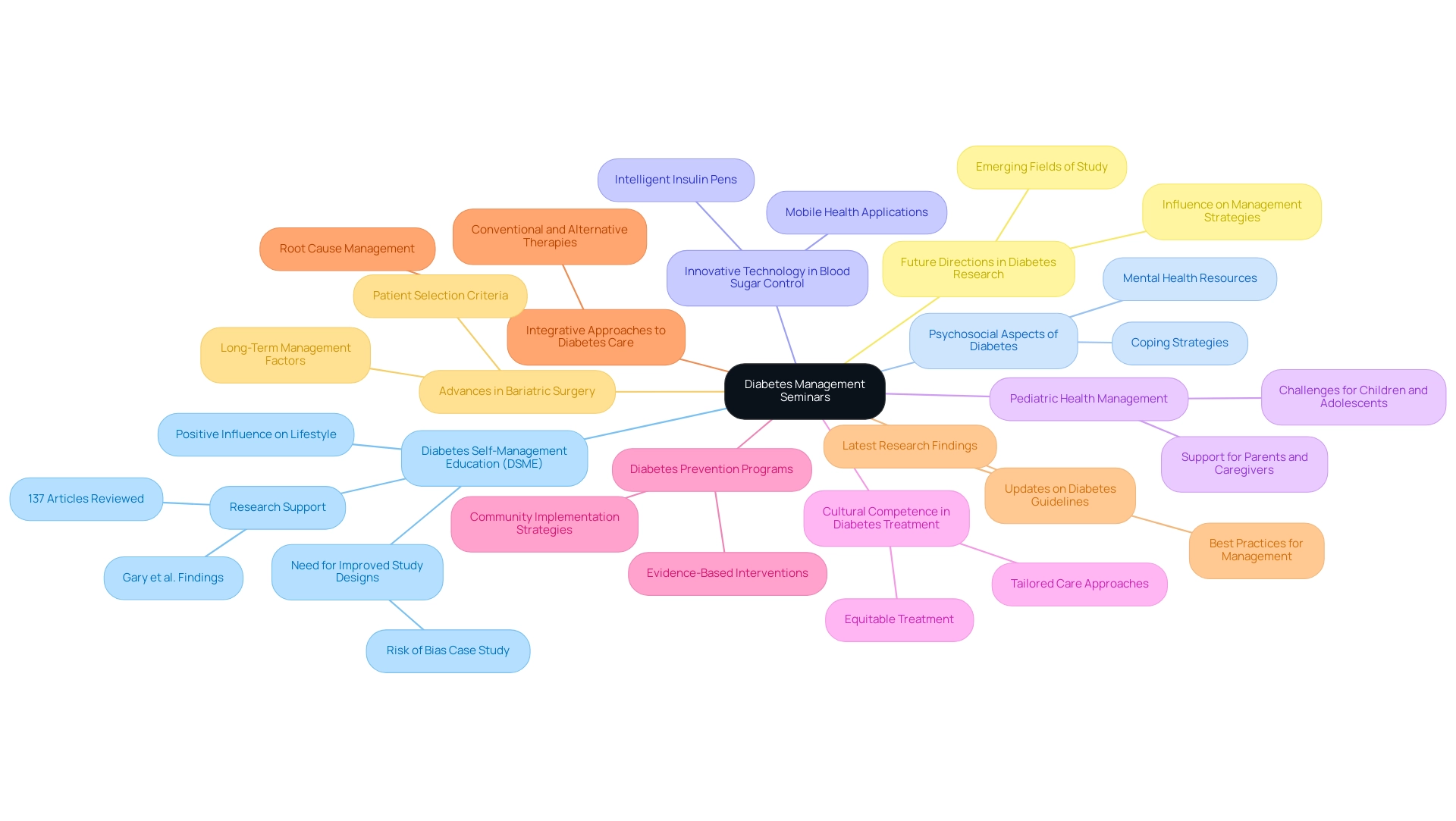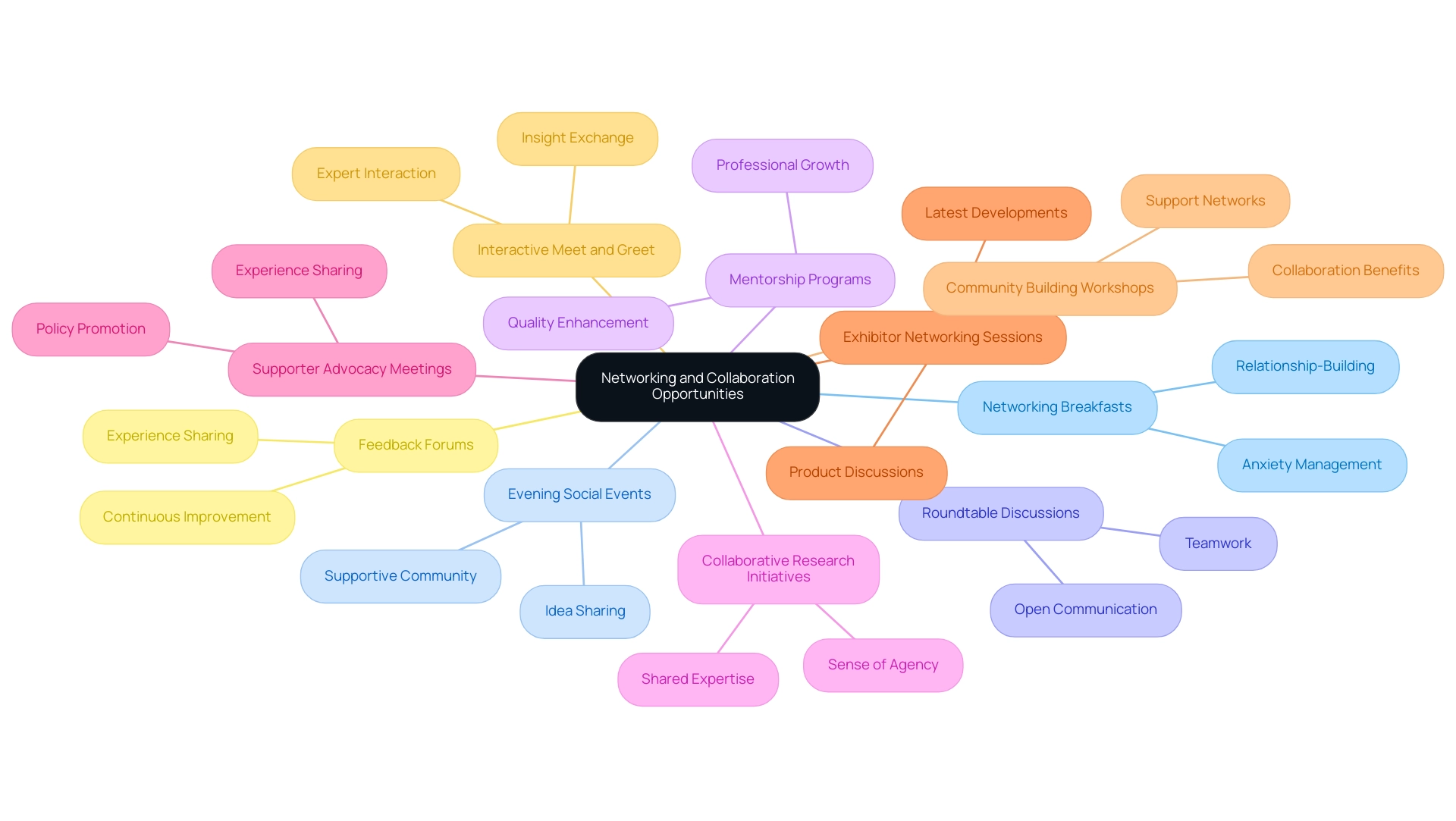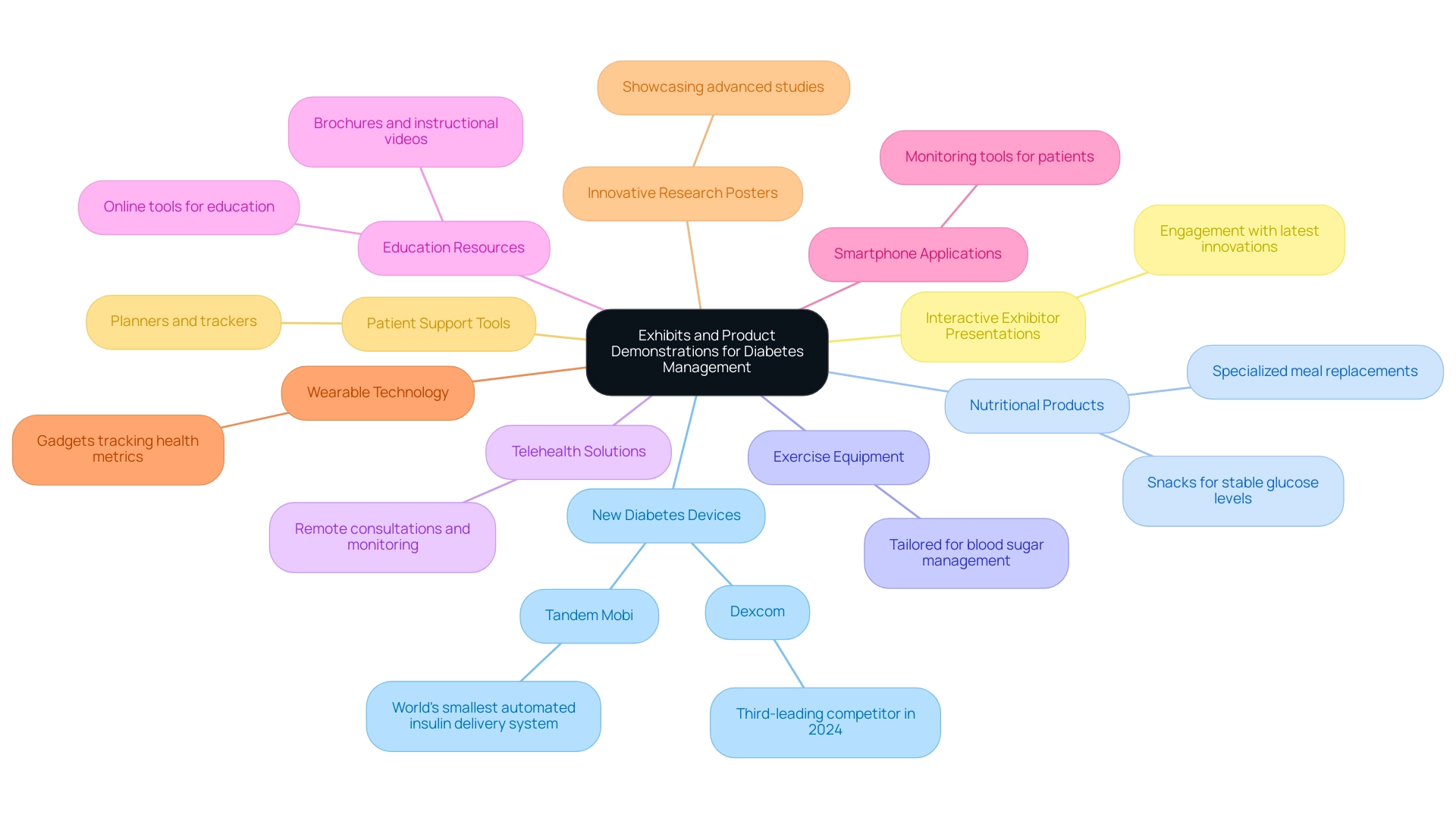Overview
The article focuses on the top ten must-see events at the ADA Orlando 2024 conference, highlighting key presentations, workshops, and networking opportunities aimed at enhancing diabetes management. It emphasizes the importance of engaging with expert-led discussions, innovative technology demonstrations, and community-building activities, all designed to empower attendees with practical knowledge and support for managing blood sugar levels effectively.
Introduction
As the ADA Orlando 2024 conference approaches, it promises to be a pivotal event for healthcare professionals, researchers, and individuals living with diabetes. With a focus on the latest advancements in diabetes care, the conference will feature an array of keynote addresses, workshops, and panel discussions aimed at enhancing understanding and management of this chronic condition. Attendees will have the opportunity to explore:
- Groundbreaking research
- Innovative technologies
- Practical strategies for holistic care
From engaging seminars on diabetes self-management to interactive sessions designed to foster networking and collaboration, the event is set to empower participants with valuable insights and tools essential for navigating the complexities of diabetes management.
Top Highlights to Experience at ADA Orlando 2024
-
The keynote address at the ADA Orlando 2024 conference will be delivered by leading experts in research related to blood sugar regulation, offering attendees valuable insights into the latest trends and breakthroughs in care. This is essential, particularly as the prevalence of type 2 conditions continues to rise, with 5,293 children and adolescents aged 10 to 19 diagnosed in 2017–2018. The discussions will include a focus on holistic approaches to reversing the condition by addressing root causes, empowering patients to take charge of their health, and eliminating the anxiety associated with potential complications of the disease.
Workshops on Lifestyle Modifications: Engaging workshops centered on practical strategies, including ada orlando, for managing health through nutrition and exercise will be available, providing hands-on experiences for attendees to apply in their daily lives. These workshops will highlight practical strategies that can greatly enhance health outcomes, particularly stressing the significance of comprehensive care in addressing conventional treatment obstacles. Notably, a hybrid workshop format will allow for virtual participation via a link distributed prior to the event, including discussions on specific holistic regimens that can help alleviate worries about complications.
-
Networking Opportunities at Ada Orlando: Attendees will have numerous chances to connect with healthcare experts, researchers, and fellow individuals, fostering relationships that can improve collaborative efforts in health management. Experts emphasize that networking is vital, as it can lead to improved patient outcomes through shared knowledge and support, particularly in challenging misconceptions about the condition and reducing anxiety regarding the illness.
Exhibition Hall: A trip to the exhibition hall is crucial, featuring innovative products and services aimed at enhancing health management. Attendees will have the chance to explore the latest technologies and solutions that can aid in managing their condition more effectively, including those that address insulin resistance and promote holistic health.
-
Panel Discussions on Emerging Trends: Engage in panel discussions with specialists who will explore new trends in managing health conditions, including the influence of technology, ada orlando, and tailored treatment methods. These discussions will offer essential insights into the changing environment of health management, including integrative methods that challenge conventional treatments and assist in empowering patients against anxiety associated with complications.
Interactive Q&A Sessions: These sessions will allow participants to interact directly with specialists, posing inquiries and acquiring knowledge on particular subjects related to health management. This interaction promotes a deeper comprehension of intricate issues in blood sugar control, including the psychological facets such as anxiety concerning complications.
Support Groups and Community Sessions: Attendees can join sessions designed to build community and support among individuals living with this condition, similar to the ada orlando initiative, allowing for the sharing of experiences and strategies for effective oversight, which is increasingly recognized as essential for holistic care and reducing worries about complications.
Culinary Demonstrations: Learn about healthy cooking techniques through live culinary demonstrations tailored for diabetes-friendly meals. These sessions will emphasize the importance of nutrition in managing blood sugar levels and provide practical cooking skills to attendees, reinforcing the holistic approach to health.
Fitness Challenges: Participate in fitness challenges aimed at encouraging physical activity among participants, emphasizing the significance of exercise in managing health. Such initiatives are vital, considering that 80.6% of U.S. adults with diagnosed conditions have high blood pressure, highlighting the need for comprehensive lifestyle modifications.
Case Study Presentation: One of the highlighted case studies, ‘Hsd17b13 Loss and Glucose-insulin Metabolism,’ investigates the impact of Hsd17b13 loss on glucose-insulin metabolism, illustrating the adverse effects on metabolic health. This research highlights the significance of comprehending genetic elements in blood sugar control, contributing to a wider view on holistic health.
Closing Ceremony: The conference will conclude with a closing ceremony summarizing key takeaways and setting the stage for future events. Allison Hurst from The Scientific Consulting Group, Inc. emphasizes the importance of meeting logistics, stating, ‘Our goal is to ensure a seamless experience for all participants.’ This guarantees that participants depart with practical insights and a refreshed dedication to their health journey.
Groundbreaking Research and Innovations to Watch
-
Advancements in Continuous Glucose Monitoring (CGM): Recent developments in continuous glucose monitoring technology have significantly enhanced the accuracy and usability of glucose tracking devices, which are crucial for managing blood sugar levels during pregnancy and addressing insulin resistance. The integration of real-time information enables individuals to handle their condition more effectively, particularly in the context of gestational issues.
Studies show that histograms of blood glucose rates indicate a marked reduction in fluctuations post-islet transplantation, with average glucose traces observed over a 72-hour period pre- and 4 weeks post-islet transplantation, highlighting the effectiveness of CGM in stabilizing glucose levels. Research support from organizations such as Abbott Diabetes Care underscores the clinical importance of CGM, which is increasingly recognized as essential for evaluating treatment regimens and managing glycemic control.
Dr. David Rodbard, an expert in the field, notes,
The accuracy, reliability, and robustness of CGM permits use for adjustment of insulin dosage for basal insulin and premeal and correction boluses, without confirmation by a blood glucose meter.
Furthermore, conventional therapies for blood sugar issues can present considerable dangers, especially for individuals with insulin resistance, necessitating the adoption of a holistic strategy for handling the condition. Recent case studies demonstrate the applicability of CGM and flash glucose monitoring technologies for individuals requiring basal-bolus insulin therapy, showing that these methods can effectively identify glucose variability and improve overall glycemic control.
Collectively, these advancements in CGM technology not only enhance individual autonomy but also provide healthcare providers with valuable insights for therapy adjustments, supporting a more comprehensive approach to managing blood sugar levels that considers both modern technologies and the dangers of traditional treatments.
Engaging Seminars and Expert Panels
- Diabetes Self-Management Education (DSME): Participating in seminars focused on DSME is crucial for individuals seeking effective self-management strategies. Notably, a systematic review indicates that DSME positively influences lifestyle and clinical outcomes for individuals with type 2, particularly when supported by robust resources and educational frameworks. In fact, 137 articles were obtained through the selection process for the study on blood sugar management education, underscoring the breadth of research supporting its effectiveness. Additionally, larger studies have documented a greater improvement in HbA1c levels, as noted by Gary et al., which underscores the importance of comprehensive education programs. Furthermore, the quality of included studies was assessed in a case study titled ‘Risk of Bias,’ revealing a high risk of bias in many cases due to non-blinding. This highlights the need for improved study designs to enhance the reliability of DSME effectiveness evaluations.
- Psychosocial Aspects of Diabetes: Engaging in discussions about the psychological impact of this condition is essential. These discussions often focus on coping strategies, mental health resources, and the psychosocial interventions that can significantly enhance individual well-being. Recent research has indicated that tackling psychosocial elements is essential for effective management of the condition, offering individuals the resources required to handle their situation.
- Innovative Technology in Blood Sugar Control: Attending sessions on the latest technological advancements in blood sugar management is highly beneficial. Innovations like intelligent insulin pens and mobile health applications are revolutionizing treatment, allowing individuals to track and control their health more efficiently.
- Pediatric Health Management: Special seminars focused on pediatric health management tackle the unique challenges that children and adolescents encounter. These sessions offer valuable insights and strategies for parents and caregivers, ensuring that young individuals receive tailored support.
- Cultural Competence in Diabetes Treatment: Investigating the significance of cultural competence in managing blood sugar conditions is crucial for providing tailored support. Discussions will focus on how to adapt care approaches to meet the diverse needs of patients from various cultural backgrounds, ensuring equitable treatment.
- Diabetes Prevention Programs: Discovering evidence-based programs for preventing this condition is critical for mitigating the risk of developing type 2. Seminars will highlight successful interventions that can be implemented across different communities, showcasing effective strategies for prevention.
- Integrative Approaches to Diabetes Care: Engaging with experts in integrative approaches offers a comprehensive view of managing the condition. These discussions frequently blend conventional and alternative therapies, offering individuals a comprehensive approach to their well-being, tackling root causes, and enabling them towards improved health.
- Updates on Diabetes Guidelines: Staying informed about the latest updates to blood sugar management guidelines is vital for healthcare providers and patients alike. These updates ensure that attendees are knowledgeable about best practices, promoting effective management of the condition.
- Advances in Bariatric Surgery: Learning about the role of bariatric surgery in managing blood sugar conditions is crucial for understanding treatment options. Conversations will address patient selection, results, and long-term management factors, offering insights into how surgical procedures can influence blood sugar regulation.
- Future Directions in Diabetes Research: Engaging in discussions about upcoming research pathways is crucial for anyone interested in the changing environment of managing this condition. These sessions will provide insights into emerging fields of study that could significantly influence management strategies in the coming years.
Call to Action: Don’t miss out on these transformative sessions—Register Now to secure your spot and take the first step towards better management! Remember, grasping the possible complications of this condition is vital for effective management, and we are here to assist you in reassessing the origin of your illness and tackling your health at the fundamental level.
Networking and Collaboration Opportunities
-
Networking Breakfasts: Begin your day with networking breakfasts specifically designed to facilitate connections among healthcare providers, researchers, and patients. These informal gatherings encourage relationship-building in a relaxed environment, fostering collaboration that is crucial for effective health care. By sharing experiences and resources, participants can empower each other to manage their anxiety about health conditions more effectively. According to a Choudhury 2018 study involving 14 hospitals and 288 physicians, effective networking is associated with enhanced outcomes in managing health conditions.
-
Evening Social Events: Participate in evening social events that offer informal networking opportunities. These events enable participants to connect over common interests in health management, fostering a relaxed environment for sharing ideas and experiences. This camaraderie can help alleviate anxiety by offering individuals a supportive community.
-
Roundtable Discussions: Participate in roundtable discussions centered on urgent issues in blood sugar management. These sessions encourage open communication and teamwork, allowing healthcare professionals to exchange insights and strategies that can improve service quality. Discussions can include holistic approaches to addressing root causes of the condition, which is essential for empowering patients. As Zappa noted, emergent networks can be effectively represented by a small number of local rules, which can guide these discussions.
-
Mentorship Programs: Take advantage of mentorship programs where experienced professionals provide guidance to newcomers in the field. Such initiatives are essential for professional growth, enabling mentees to learn from seasoned experts and enhancing the overall quality of health management. The Zappa 2014 case study highlights how oncologists in a virtual community successfully cooperated, demonstrating the benefits of mentorship in fostering collaboration and empowering patients.
-
Collaborative Research Initiatives: Discover collaborative research initiatives that attendees can join. These collaborations are crucial for promoting research and support, as they unite varied expertise and resources to address shared challenges. Participating in research can also offer individuals a sense of agency and involvement in their care.
-
Supporter Advocacy Meetings: Participate in gatherings focused on supporter advocacy, where individuals can share their experiences and promote enhanced health policies. This platform not only empowers individuals but also ensures their voices are heard in the healthcare community, helping to reduce anxiety about their treatment options.
-
Exhibitor Networking Sessions: Engage with exhibitors during dedicated networking sessions. These interactions create chances to talk about new products and services directly with innovators, enabling healthcare professionals to remain informed about the latest developments in managing blood sugar that can enhance outcomes for individuals.
-
Community Building Workshops: Take part in workshops aimed at nurturing connections among care providers and individuals. These sessions emphasize the significance of support networks, illustrating how collaboration can enhance outcomes for those impacted by the condition and alleviate feelings of isolation.
-
Interactive Meet and Greet: Join interactive meet and greet sessions where attendees can connect with speakers and experts. These encounters promote inquiries and the exchange of insights, enhancing the overall conference experience and offering individuals with valuable information to manage their condition.
-
Feedback Forums: Attend feedback forums to share your experiences and suggestions for future conferences. These discussions cultivate a cooperative atmosphere, encouraging continuous enhancement and ensuring that the requirements of the health support community are fulfilled, ultimately enabling individuals to take an active role in their well-being.
Exhibits and Product Demonstrations
- New Diabetes Devices: The ADA Orlando Conference in 2024 showcased groundbreaking devices for managing blood sugar, including the recently launched Tandem Mobi, heralded as the world’s smallest automated insulin delivery system. Such innovations are crucial in enhancing patient care and improving outcomes related to blood sugar regulation. Dexcom has emerged as the third-leading competitor in the market in 2024, indicating a competitive landscape driven by advancements in continuous glucose monitoring tools. Furthermore, the devices market for managing blood sugar is projected to be worth USD 67.39 billion by 2034, with a CAGR of 8.1%, underscoring significant growth opportunities in care for blood sugar management.
- Nutritional Products: A variety of nutritional items customized for blood sugar control is now accessible, including specialized meal replacement choices and snacks created to sustain stable glucose levels. These products are essential for individuals handling blood sugar levels, providing convenient and health-conscious choices.
- Exercise Equipment: To assist in managing blood sugar levels, exercise equipment specifically tailored for individuals with this condition is gaining attention. Regular physical activity is crucial for managing blood glucose levels, and these tools promote an active lifestyle.
- Telehealth Solutions: The rise of telehealth solutions facilitates remote consultations and monitoring, significantly enhancing access to care for individuals. Such innovations are crucial in bridging the gap in managing blood sugar levels, especially for those in remote areas.
- Education Resources: The ADA Orlando Conference provided access to a wealth of educational materials for both healthcare providers and individuals. These include brochures, instructional videos, and online tools aimed at enhancing education and awareness regarding the condition.
- Smartphone Applications: Demonstrations of smartphone applications that help patients in monitoring their condition were highlighted prominently. These apps provide comprehensive tools for monitoring diet, medication adherence, and overall health metrics.
- Wearable Technology: The investigation of wearable technology unveiled gadgets that track essential health metrics pertinent to blood sugar control. These wearables offer real-time feedback, empowering users to make informed health decisions.
- Innovative Research Posters: Attendees had the opportunity to view innovative research posters showcasing advanced studies and discoveries in health management. This platform fosters knowledge sharing and encourages advancements in treatment methodologies.
- Patient Support Tools: To aid in managing blood sugar levels, various patient support tools were showcased, including planners and trackers that assist individuals in organizing their daily routines and health goals.
- Interactive Exhibitor Presentations: Engaging with exhibitors through interactive presentations allowed attendees to experience the latest innovations firsthand. This direct engagement fosters a deeper understanding of the products and their applications in diabetes care.
Conclusion
The ADA Orlando 2024 conference is poised to be a transformative event for all involved in diabetes care, from healthcare professionals to patients. The conference will feature a rich array of keynote addresses, workshops, and panel discussions that highlight groundbreaking research and innovative technologies in diabetes management. Key topics will include:
- Holistic approaches to care
- Lifestyle modifications
- The importance of networking
All aimed at fostering collaboration and improving patient outcomes.
Attendees can look forward to engaging seminars that delve into:
- Diabetes self-management education
- Psychosocial aspects of diabetes
- The latest advancements in technology
These sessions will empower individuals to better understand their condition and develop effective management strategies, reinforcing the need for comprehensive education and support. Moreover, opportunities for networking and collaboration will enhance the experience, allowing participants to build meaningful connections and share valuable insights.
Ultimately, the conference serves as a crucial platform for advancing diabetes care, focusing on innovative treatments and the importance of community support. By participating in these discussions and workshops, attendees will leave equipped with actionable knowledge and renewed motivation to tackle the complexities of diabetes management. Engaging with experts and peers will not only alleviate anxiety surrounding the condition but also inspire a collective commitment to improving health outcomes for individuals living with diabetes.
Frequently Asked Questions
What is the focus of the keynote address at the ADA Orlando 2024 conference?
The keynote address will feature leading experts discussing research related to blood sugar regulation, emphasizing holistic approaches to reversing type 2 conditions and empowering patients.
What workshops will be available at the conference?
The conference will offer workshops on lifestyle modifications focused on practical strategies for managing health through nutrition and exercise, including a hybrid format for virtual participation.
Why are networking opportunities important at the ADA Orlando conference?
Networking allows attendees to connect with healthcare experts and peers, fostering relationships that can enhance collaborative health management and improve patient outcomes.
What can attendees expect to find in the exhibition hall?
The exhibition hall will showcase innovative products and services aimed at health management, including technologies that address insulin resistance and promote holistic health.
What topics will be covered in the panel discussions at the conference?
Panel discussions will explore emerging trends in health management, including the role of technology and tailored treatment methods, as well as integrative approaches to empower patients.
How will interactive Q&A sessions benefit attendees?
Interactive Q&A sessions will allow participants to engage directly with specialists, facilitating a deeper understanding of complex issues related to blood sugar control and anxiety management.
What is the purpose of support groups and community sessions at the conference?
These sessions aim to build community among individuals living with diabetes, allowing attendees to share experiences and strategies for effective health management.
What will culinary demonstrations at the conference focus on?
Culinary demonstrations will teach healthy cooking techniques for diabetes-friendly meals, highlighting the importance of nutrition in blood sugar management.
What activities will be included to promote physical activity?
The conference will feature fitness challenges designed to encourage physical activity, emphasizing the role of exercise in managing health.
What is one of the highlighted case studies presented at the conference?
The case study ‘Hsd17b13 Loss and Glucose-insulin Metabolism’ examines the impact of genetic factors on metabolic health and blood sugar control.
What will occur during the closing ceremony of the conference?
The closing ceremony will summarize key takeaways from the event and emphasize the importance of a seamless experience for participants, setting the stage for future events.
